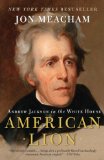Summary | Excerpt | Reviews | Readalikes | Genres & Themes | Author Bio

Andrew Jackson in the White House
by Jon Meacham
Still, the roots of Jackson’s intellectual and rhetorical imagination lie in Waxhaw. Down the years Jackson could quote Shakespeare, Plutarch, and Alexander Pope, and almost certainly read more books than his harshest critics believed, but the foundations of his worldview most likely came from his childhood Sundays in South Carolina, where he spent hours soaking in eighteenth- century Presbyterianism.
Elizabeth Jackson wanted her Andrew to be a minister, an ambition for him that may have been among the reasons he was able to envision himself rising to a place of authority. Even more so than in succeeding American generations, clergymen played a central and special role in the life of the eighteenth and early nineteenth centuries. They were often the most educated men in a given place, conversant not only with scripture but with ancient tongues and the touchstones of English literature. They held center stage, with a standing claim on the time and attention (at least feigned) of their flocks, and they presided at the most important public moments of a Christian’s life–baptism, communion, marriage, death. Jackson’s sense of himself as someone set apart–the word “ordain” derives from the word “order,” and an ordained figure is one who puts things in order, arranges them, controls and even commands them–may have come in part from hearing his mother speak of him in such terms.
Jackson found other, larger spheres over which to preside than Carolina churches, but it would be a mistake to pass too quickly over the lasting influence his churchgoing had on the way he thought, spoke, wrote, and saw the world. He attended services at the Waxhaw meetinghouse throughout his early years, and these childhood Sabbaths are worth considering in trying to solve the mystery of how a man with so little formal education and such a sporadic–if occasionally intense–interest in books developed his sense of history and of humanity.
The service the Jacksons attended most likely started in midmorning. A psalm was sung–but without organ music, for Presbyterians were austere not only in their theology but in their liturgy–and a prayer said. Church historians suspect such prayers could stretch beyond twenty minutes in length. Then came a lesson from scripture–the selection could range from an entire chapter of a book of the Bible to a shorter reading followed by an explication–followed by the centerpiece of the morning: the minister’s sermon, an address that could range in length from thirty minutes to an hour. Another psalm or hymn closed the morning, which had by now consumed two hours of the day. There was a break for lunch, then an afternoon version of the same service, which everyone attended as well.
From his babyhood, then, Andrew Jackson probably spent between three and four hours nearly every Sunday for about fourteen years hearing prayers, psalms, scripture, sermons, and hymns: highly formalized, intense language evoking the most epic of battles with the greatest of stakes. In the words flowing from the minister on all those Sundays, Jackson would have been transported to imaginative realms where good and evil were at war, where kings and prophets on the side of the Lord struggled against the darker powers of the earth, where man’s path through a confusing world was lit by a peculiar intermingling of Christian mercy and might. God may well plan on exalting the humble and meek, but Jackson also heard the call of Gideon’s trumpet–the call to, as Saint Paul put it, fight the good fight.
Throughout his life, when he was under pressure, Jackson returned to the verses and tales of the Bible he had first heard in his childhood. He referred to political enemies as “Judases,” and at one horrible moment during the attacks on Rachel’s virtue in the 1828 campaign, Jackson’s mind raced to the language and force of the Bible in a crowded collection of allusions. “Should the uncircumcised philistines send forth their Goliath to destroy the liberty of the people and compel them to worship Mammon, they may find a David who trusts in the God of Abraham, Isaac, and of Jacob, for when I fight, it is the battles of my country,” Jackson wrote a friend.
Excerpted from American Lion by Jon Meacham Copyright © 2008 by Jon Meacham. Excerpted by permission of Random House, a division of Random House, Inc. All rights reserved. No part of this excerpt may be reproduced or reprinted without permission in writing from the publisher.




The dirtiest book of all is the expurgated book
Click Here to find out who said this, as well as discovering other famous literary quotes!
Your guide toexceptional books
BookBrowse seeks out and recommends the best in contemporary fiction and nonfiction—books that not only engage and entertain but also deepen our understanding of ourselves and the world around us.